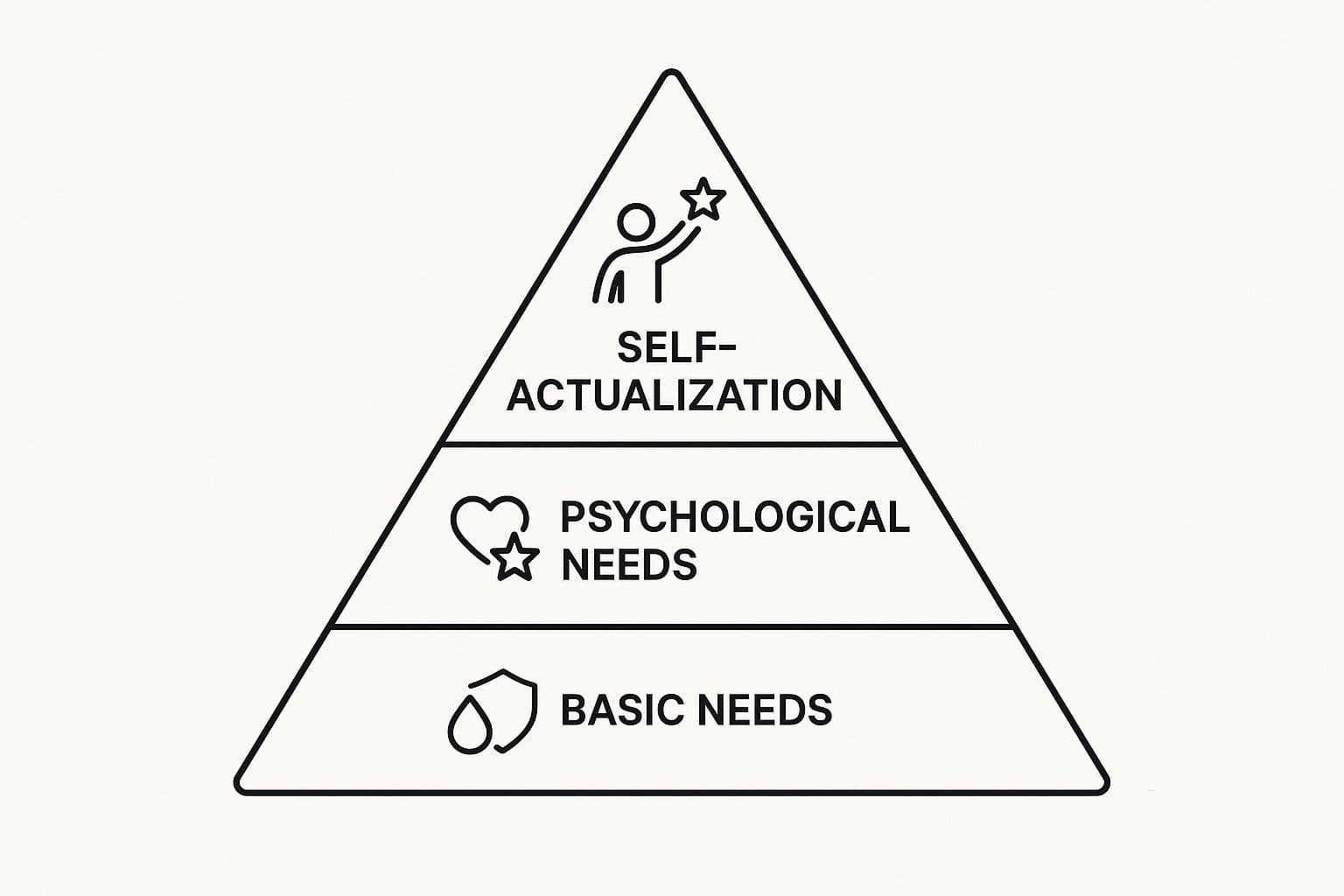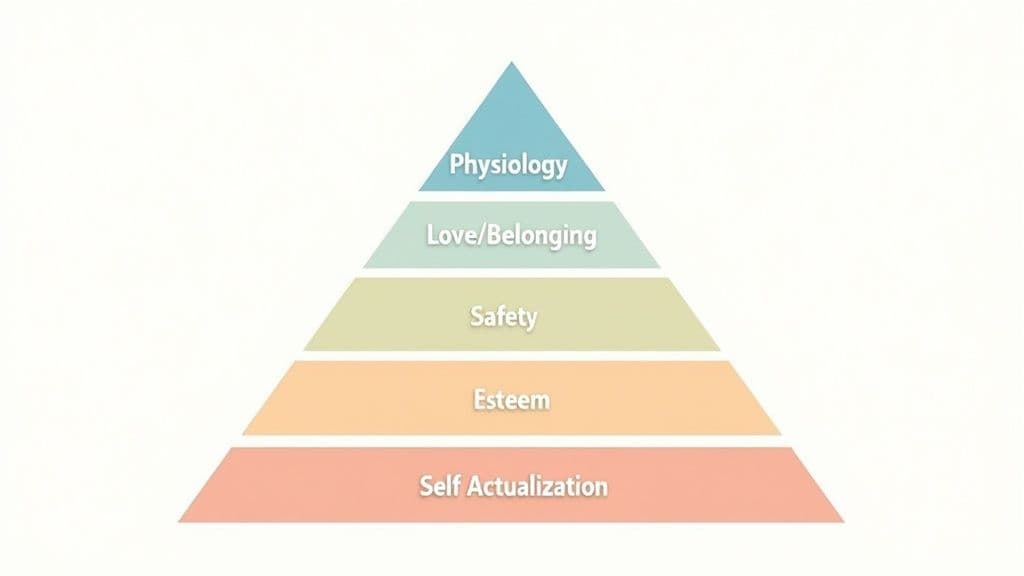Self-actualization is the ongoing journey to become the best version of yourself — realizing your talents, clarifying purpose, and living in ways that feel true to you. This article breaks down Maslow’s model, core traits of self-actualized people, and practical actions, tools, and exercises you can use today to build clarity and momentum.
September 17, 2025 (5mo ago) — last updated March 2, 2026 (Today)
Self-Actualization: Practical Steps to Reach Your Potential
Discover practical steps, traits, and research-backed strategies to grow, find purpose, and live more authentically through self-actualization.
← Back to blog
Self-Actualization: Practical Steps to Reach Your Potential
Discover what self-actualization means, the core traits of self-actualized people, and clear steps you can use to grow, find purpose, and live more authentically.
Introduction
Self-actualization is the ongoing journey to become the best version of yourself — realizing your talents, clarifying purpose, and living in ways that feel true to you. This article breaks down Maslow’s model, the core traits of self-actualized people, and practical actions, tools, and exercises you can use today to build clarity and momentum.
What Is Self-Actualization?
Picture a tiny acorn that contains the blueprint of an oak tree. Self-actualization is the process of giving that acorn the conditions it needs so it can grow into its full potential.
This idea sits at the top of Abraham Maslow’s Hierarchy of Needs1. It becomes a primary drive once basic needs like safety, belonging, and esteem are reasonably met.
The journey, not the destination
Self-actualization is not a finish line. It’s an ongoing process of growth and self-discovery. A crucial first step is building self-awareness so you can understand who you are at your core. For practical guidance, see our guide on how to develop self awareness.
Maslow’s pyramid shows how a stable foundation of physical and psychological needs supports the pursuit of higher fulfillment1.

Self-actualization is not an abstract ideal but a natural peak of human motivation grounded in wellbeing.
Core Pillars of Self-Actualization
These essential ingredients make the concept practical and actionable:
- Authenticity: Being genuinely yourself without pretending for others.
- Purpose: A clear sense of why you’re here and what drives you.
- Growth mindset: Believing you can learn, improve, and adapt.
- Acceptance: Embracing yourself, others, and reality as they are.
- Peak experiences: Moments of deep joy, awe, and connection.
- Autonomy: Choosing in ways that align with your values.
These pillars work together to guide you toward a meaningful, creative life.
The Origins of the Self-Actualization Concept

The concept traces back to neurologist Kurt Goldstein, who described an organism’s drive to realize its potential2. Abraham Maslow later popularized the idea in psychology and placed self-actualization at the top of his Hierarchy of Needs1.
Maslow and the Hierarchy of Needs
Maslow used a pyramid to show how basic needs—food and safety—form the foundation for psychological needs like belonging and esteem, enabling the pursuit of self-actualization when those foundations are reasonably secure1.
“For Maslow, self-actualization represented the ‘desire to become more and more what one is, to become everything that one is capable of becoming.’”
Maslow’s framework offers a practical map for personal growth.
Key Characteristics of a Self-Actualized Person

What does self-actualization look like in daily life? Common traits include:
- Clear and accurate perception of reality; seeing things as they are without distortion.
- Profound acceptance of self and others; acknowledging flaws without shame.
- Spontaneity and inner-directedness; actions align with an internal code.
- Freshness of appreciation for ordinary experiences—wonder, gratitude, and awe.
- Mission-driven focus; channelling energy into creative work, causes, or service.
Emotional intelligence supports these qualities; learning to build emotional intelligence helps strengthen self-awareness and acceptance. For practical steps, see our guide on how to build emotional intelligence.
Modern research highlights autonomy as a core contributor to wellbeing: Self-Determination Theory links autonomy, competence, and relatedness to intrinsic motivation and psychological health3.
Self-Actualization in History
Real-world examples show self-actualization is not reserved for the privileged. Leaders like Frederick Douglass, W.E.B. Du Bois, and Booker T. Washington transformed adversity into purpose and social contribution. Their lives illustrate how resilience and mission can foster profound growth.
Frederick Douglass taught himself to read while enslaved, escaped to freedom, and became an influential voice for abolition—using hardship as fuel for purpose.
How to Begin Your Journey Toward Self-Actualization

Start with small, consistent actions you can repeat:
- Cultivate self-awareness. Observe thoughts, feelings, and behaviors without judgment. Practices like meditation and journaling help clarify patterns and priorities6.
- Embrace authenticity. Ask, “Is this decision true to me?” and align actions with your values.
- Adopt a growth mindset. Treat challenges as opportunities to learn and adapt.
A practical tool for clarifying purpose is Dan Millman’s framework from The Life You Were Born to Live. The Life Purpose App uses your birth date to identify strengths and challenges and offers a structured path toward purpose-driven living4.
Journaling prompts and retreats can accelerate insight. See our self-discovery journal prompts for ideas.
By combining self-awareness, authenticity, and a growth mindset, you build a strong foundation for long-term growth.
Clearing Up Common Questions About Self-Actualization
Self-actualization is often misunderstood. Here are concise answers to frequent concerns.
Is self-actualization a final destination?
No. It’s an ongoing process of unfolding your potential. There will always be new ways to grow and express yourself.
Can I work on self-actualization if my basic needs aren’t fully met?
Yes. While stability helps, growth and adversity often occur together. You can cultivate creativity and meaning even amid challenges. Research links a sense of purpose to better physical and mental health outcomes, including lower mortality risk in some studies5.
Do I need to be famous or extraordinary to be self-actualized?
No. Self-actualization is measured by your internal sense of authenticity and purpose, not external recognition. A teacher, carpenter, or parent can be as self-actualized as a public figure.
Quick Q&A — Common User Questions
Q: What is self-actualization in one sentence?
A: Self-actualization is the ongoing process of realizing your unique potential and living a life aligned with your values and purpose.
Q: What are the first steps I can take today?
A: Start with self-awareness (meditation or journaling), clarify your values, and take one small action that reflects those values.
Q: How do I know I’m making progress?
A: Look for deeper satisfaction, clearer values-driven choices, closer relationships, and moments of flow or awe.
Short Q&A: Practical Concerns
Q: How long does this take?
A: There’s no set timeline. Progress depends on your starting point, resources, and consistency. Small daily habits compound over months and years.
Q: What if I feel stuck?
A: Focus on one clear practice: a daily journaling prompt, a values checklist, or weekly reflection. External support—therapy, coaching, or a retreat—can accelerate insight.
Q: Which habit gives the biggest return?
A: Regular self-reflection. A simple habit of 5–10 minutes of focused journaling or mindfulness each day improves clarity and decision-making6.
Bottomline Q&A — Rapid Answers
Q: Can self-actualization fit into a busy life?
A: Yes. Small, consistent practices like short daily journaling and values-based actions add up over time.
Q: What’s one measurable benefit of pursuing purpose?
A: Research finds a consistent association between a strong sense of purpose and better health outcomes, including reduced mortality risk in longitudinal studies5.
Q: Where should I start if I don’t know my values?
A: Try a values checklist, a short journaling exercise, or a guided self-discovery tool such as the resources on Life Purpose App4.
Discover Your Life Purpose Today!
Unlock your true potential and find your life’s purpose.
